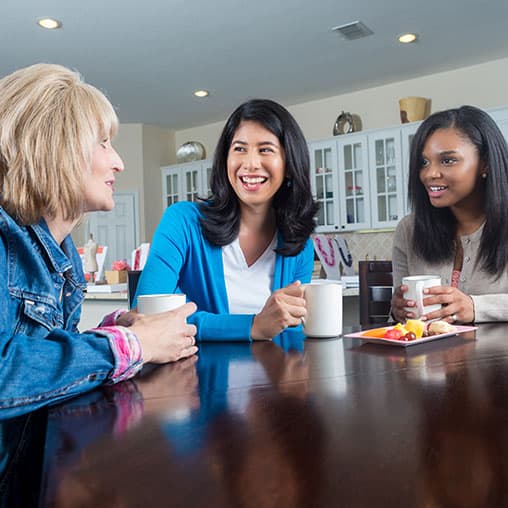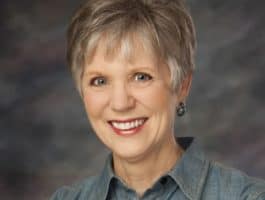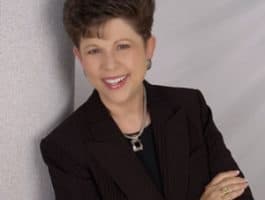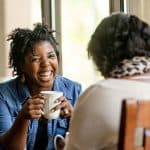
What Is a Mentor?
Who are you pouring into? Authors and professors Barbara Neumann and Dr. Sue Edwards describe what organic mentoring is: a natural, less contrived relationship where one woman listens, encourages, and builds up the other. Neumann and Edwards remind mentors that young women don't really want "the Bible answer woman," but rather a trusted friend who will share her own life stories.
Show Notes
About the Host
About the Guest
-
Who are you pouring into? Authors and professors Barbara Neumann and Dr. Sue Edwards describe what organic mentoring is: a natural, less contrived relationship where one woman listens, encourages, and builds up the other. Neumann and Edwards remind mentors that young women don't really want "the Bible answer woman," but rather a trusted friend who will share her own life stories.
-
Dave and Ann Wilson
Dave and Ann Wilson are hosts of FamilyLife Today®, FamilyLife’s nationally-syndicated radio program. Dave and Ann have been married for more than 38 years and have spent the last 33 teaching and mentoring couples and parents across the country. They have been featured speakers at FamilyLife’s Weekend to Remember® marriage getaway since 1993 and have also hosted their own marriage conferences across the country. Cofounders of Kensington Church—a national, multicampus church that hosts more than 14,000 visitors every weekend—the Wilsons are the creative force behind DVD teaching series Rock Your Marriage and The Survival Guide To Parenting, as well as authors of the recently released book Vertical Marriage (Zondervan, 2019). Dave is a graduate of the International School of Theology, where he received a Master of Divinity degree. A Ball State University Hall of Fame quarterback, Dave served the Detroit Lions as chaplain for 33 years. Ann attended the University of Kentucky. She has been active alongside Dave in ministry as a speaker, writer, small-group leader, and mentor to countless wives of professional athletes. The Wilsons live in the Detroit area. They have three grown sons, CJ, Austin, and Cody, three daughters-in-law, and a growing number of grandchildren.
-

Barbara Neumann
Barbara Neumann (DMin, Dallas Theological Seminary) is an adjunct professor in the Educational Ministries and Leadership department at Dallas Theological Seminary.
Sue Edwards
Dr. Edward’s heartbeat is to reinforce ministry partnerships between men and women, which strengthen church and parachurch organizations locally and worldwide. She has thirty-five years of experience in Christian education and Bible teaching, directing women’s ministry, retreat and conference speaking, training teams and teachers, overseeing staff, and writing curriculum. As former pastor to women at her local church she experienced healthy men and women partnerships on staff, and her passio...more
Barbara Neumann and Dr. Sue Edwards describe what organic mentoring is: a natural, less contrived relationship where one woman listens, encourages, and builds up the other.
Bob: We often think that mentoring is like formal training—like teaching a subject to someone younger than you. Barbara Neumann says, “That’s not what younger women today are looking for when they are looking for an older woman to mentor them.”
Barbara: They want to hear stories from our life. They want to know: “How did your faith work for you in this difficult situation?” and “I want to hear what you did on that day when you wanted to walk out on your marriage,” “I want to hear about that time where you felt like you just couldn’t deal with your kids another minute longer.” It’s these life-giving stories—real stories—where they soak up biblical truth.
Bob: This is FamilyLife Today for Friday, November 20th. Our host is the President of FamilyLife®, Dennis Rainey, and I’m Bob Lepine. Your life is full of examples—both good and bad—of what it means to follow Christ. As you’ll open up and share those examples with younger people, that’s what authentic mentoring looks like.
1:00
We’ll explore that more today. Stay tuned.
And welcome to FamilyLife Today. Thanks for joining us. I had a friend of mine who—I think he had this written on a notebook that he used to carry with him—but I saw it, and I tweeted it out because I thought it was profound. He said, “You are or you will be a composite of the five people you spend the most time with.” I thought, “That’s a pretty interesting insight.” Who we become, as people, is a composite of who have been the five most influential people in our lives.
Dennis: Yes. I heard someone say, “The people you know and the books you read are those influencers in our lives.”
2:00
And people are the living books who impact our lives.
And we have a couple of Dallas Theological Seminary professors with us.
Bob: A couple of living books who are joining us. [Laughter]
Dennis: Living books who teach the Book—
Sue: We do.
Dennis: —at Dallas Theological Seminary. Dr. Sue Edwards and Dr. Barbara Neumann join us again on FamilyLife Today. Barbara, Sue, welcome back.
Sue: Thank you.
Barbara: Thank you.
Dennis: They’ve written a book called Organic Mentoring. You know, the word, organic, just kind of brings a grin to my face because I have four daughters—so, I can tell this anonymously. One of our daughters was dated by a guy who defined his relationship with my daughter—he said, “I just want us to have an organic relationship.”
Sue: Yes, that’s not surprising. And you went, “What is that?!”
Dennis: I did. I did.
Bob: “No pesticides used.” [Laughter]
Dennis: No pesticides. And so, I kind of began to watch this thing evolve.
3:00
Basically, what he was wanting was something without purpose—something that just kind of meandered along and didn’t want to have any direction to it.
Bob: Well, at some level, it sounds like what he wanted—and I’m not trying to put words in his mouth—but you ladies have described what younger women often want today is something that is a little borderless / a little boundary-less. It’s: “I want access to this when I want it or need it, but I don’t want to be bothered with it any other time.” Now, that’s okay in a mentor/mentee relationship. It’s maybe less okay in a dating—
Sue: Yes.
Bob: —potential marriage relationship.
Dennis: Yes, at some point, you’ve got to be—you’ve got to determine your intentions here.
Sue: Yes.
Dennis: You all aren’t saying that there can’t be some intentionality in the mentoring relationship.
Barbara: Absolutely—absolutely not. When they use the word, organic, what they are indicating is that they want something that is more natural—something that fits into life more naturally—
4:00
—instead of something that is contrived. But you know, the whole organic movement started with food; but now, it’s a lifestyle with many in this younger generation. It’s the way they live. It’s the—it forms a lot of their preferences. So, yes—even, maybe, extending into a dating relationship—but we don’t think that organic means without any kind of foundational structure.
Bob: You had a friend, who approached you awhile back and said: “There’s a young woman I know who is struggling. Would you mind meeting with the two of us?”
Barbara: Right.
Bob: So, it was kind of a three-way get-together for coffee. Tell us what happened in that situation.
Barbara: We had the highest hopes—I knew how to help this young woman, who was struggling; and the third party that had invited us to meet knew that. So, she was absolutely sure that this was a partnership that would work well and that it was needed. So, yes, I agreed to meet. We had a great conversation.
5:00
The young woman, who needed help, indicated that she would definitely get back in touch with me; but I never heard from her again. That didn’t surprise me because I didn’t know her; and mostly, she didn’t know me—the trust was not there. It was a pleasant conversation; but because—again, it was a contrived relationship—it didn’t go anywhere.
Bob: So, sometimes, these attempts to see if there is something there—it’s one cup of coffee; and then, nothing happens after that.
Sue: No.
Barbara: Nothing may happen, and that is fine!
Sue: Yes.
Barbara: That’s part of the process of determining where the Holy Spirit is at work—who He has for you in this natural opportunity. It’s going to be all part of the process.
Bob: It’s interesting—I was talking recently with an almond farmer in California. This guy has an almond grove about 60 acres. He grows almonds for a living. I said, “Are your almond trees organic?”
6:00
And he kind of smiled and said, “Organic is a big word.” He said, “We use a minimum amount of pesticides.” He explained that with the almond, the nut is so protected from the hull that the nut almost never gets any pesticide approaching it. But he said, “With organic farms, the yield is so much lower than it is with the cultivated farm.” He said that the reason organic products cost so much more is because the yield is so much lower per acre.
When you talk about organic mentoring, it may be a lower yield; but it may be a higher quality kind of yield that you are getting.
Sue: Well, I’m not sure it’s a lower yield. I think it’s something that young women and men—the younger generation—it’s moved into their relationships. It doesn’t mean they are without intentionality. It just means that there is a natural flow to it—the same thing with a spouse.
7:00
I mean, you hear all these different people—when you are young and you are looking for a life partner, and suddenly, there is this click. Sometimes, you can’t even explain it—it just is there. When that click is there, then, there is a natural likelihood that that relationship can blossom and thrive if it’s based on the right things. It’s the same thing with this.
Barbara: It may feel like a lower yield, though, because organic mentoring is harder to measure.
Sue: Yes.
Barbara: When we had our structured programs, we could count—
Bob: Right.
Barbara: —the number of women involved, we could look at the curriculum that was covered, and we felt like we could measure, “Okay, this is what we’ve accomplished.” But with organic mentoring, that’s not possible.
Sue: Yes.
Barbara: You can’t measure what’s happening in the younger person’s life; but we know by talking to these women that every conversation is transformational. That’s what they tell us: “Every time I talk to her…” or “Every time I talk to him, I learn something very important.”
8:00
Sue: Yes.
Dennis: About a dozen years ago, I was invited by a friend, Crawford Loritts, who had a burden for connecting an older generation of men with a bunch of younger guys. He established a mentoring relationship with four young men for me which, now, some 12 years later, continues on for two of the four.
Sue: Okay.
Barbara: Oh, yes?
Bob: This was more programmatic—what Crawford was doing it. It’s back to the old model.
Dennis: Well, it was programmatic in how it kicked off—
Bob: Right.
Dennis: —because it formed a retreat where a bunch of guys got together. Some of the clicking that you ladies have talked about, where there’s chemistry and kindred-spirit heard there—and that became kind of how they allocated: “These four guys go with him. These four guys go with this other man.”
And it’s interesting, now—back to your point of measurement, Barbara—
9:00
—it’s not always clear what kind of impact that’s having; but it is having an impact, or these guys wouldn’t continue to be meeting with me by phone.
Barbara: Exactly. Yes—exactly. We can measure our impact by the fact that this young person continues to invite us to be a part of their life / continues to engage in those conversations—however random that may feel—but it’s a continued impact.
Dennis: I recently asked a young man because he’s kind of nibbling around the edges—he’s been writing me, and phoning me, and saying some things to me, asking questions about different matters at home, and at work, et cetera. Finally, I just put an email together and said, “Hey, how about you and I get together—
Sue: Sure.
Dennis: —“once a month for a year? At the end of the year, we’ll evaluate and we’ll decide if we continue on—how about that?” So, I still haven’t heard from him. He may decide not to do it—that is okay.
10:00
It really is okay, but it seemed like there was a mutual benefit that could occur in that relationship. I say, “mutual,” because the person who is doing the mentoring always benefits. He always / she always benefits; right?
Barbara: Yes.
Sue: Yes, and that’s one thing they are saying is—that they even identify it as a reverse mentoring—that even though they are younger and not as far along in some areas of their life, they expect that you, as a mentor, will benefit as well.
And I think Barbara and I would both say that we have gained—I understand my daughters, I understand the younger generation, I understand a lot more about technology. If I have something that I need to know, as all of this crazy technology comes upon us and a tidal wave of: “Oh my goodness! Now, I’ve got to figure this out!”—I have women that can help me with that. And they love it, and they expect it.
11:00
They—it’s much more of a sense of mutuality.
It used to be that the spotlight was on the mentor. It was all about sitting at the mentor’s feet, and you giving out all of your wisdom, and they soaking it up. And that picture—to them, puts them off. They are much more about mutuality. They feel like they have something to give in this, and I’ve found they really do. It takes the pressure—I don’t have to feel like this tower of wisdom that: “If I somehow—
Dennis: Right.
Sue: —“am not everything to everybody, and I actually…”—they don’t like that. If I tried to be the Bible-answer woman, they head for the exit.
Barbara: They do. What they want to hear from us is not the Bible answer that we might want to give them, but they want to hear stories from our life. They want to know: “How did your faith work for you in this difficult situation?”
12:00
and “I want to hear what you did on that day when you wanted to walk out on your marriage,” “I want to hear about that time where you felt like you just couldn’t deal with your kids another minute longer.” It’s these life-giving stories / real stories where they soak up biblical truth.
Sue: And you can say—you can refer to the Scripture—
Barbara: Of course; yes.
Sue: —but they want to know: “How does it work?” “How does it look?” “How did it actually play out?” If you say, “I have peace because of the Holy Spirit,” they want to say: “Well, when did that happen?” and “How does that look in your life?” and “Give me an example.” So, they want to know how life works.
Bob: We are talking today to Sue Edwards and Barbara Neumann, authors of the book, Organic Mentoring, on FamilyLife Today. And you ladies have been around Dallas Seminary long enough to know that the best professors at a seminary—there is a little mentoring going on, not just in the classroom, but outside the classroom as well.
Barbara: Absolutely.
13:00
Bob: In fact, Dennis would identify one of the primary mentors in his life having been somebody whose classes he has sat in, back in the early ‘70s. And I’m guessing you could pick which professor that was; couldn’t you?
Sue: It was probably—he was a mentor to me too—Howard Hendricks.
Dennis: Right.
Sue: Yes.
Dennis: But it continued beyond the classroom.
Sue: Yes.
Dennis: It may have started there from kind of a getting-to-know-you standpoint; but he showed personal interest in me.
Sue: Yes.
Dennis: I mean, he brought a lot of life just by believing in me and encouraging me along the way.
One of the things I want you ladies to comment on here because I think a lot of women today—and men—don’t see themselves as mentors because they don’t think they are smart enough. I mean, Howard Hendricks—okay, you can understand why he would be a mentor. He taught for 60 years / had 13,000 students in his classes. I mean—okay, he’s a mentor—but the person, who is listening to this broadcast, and driving a truck or on her way to school, taking the kids to drop them off:
14:00
“How do they know if they have something they can pass on to a younger generation?”
Barbara: Yes, I think this is our biggest obstacle today in the whole mentoring culture; and that is our older women, overwhelmingly, do not feel qualified. As a result, they will not respond to the natural opportunities that are popping up with the women around them. So, this is what we need to address.
I think, Dennis, helping our older women to understand that—if you are following Christ and you’ve been doing that for a little while, then, you know some things. You have worked out some things. You have found the Bible to be true in your life in a number of different ways, and this is what our younger women are absolutely hungry to hear. They want to hear about your life, your life with God, how the Bible has worked for you. Any woman can do that.
15:00
Bob: But here is part of the reason that feels intimidating—is because you know, at some point, you are going to be sitting across the table from a younger woman, who is going to say, “I’m struggling with this in my life,” and you’re going to think: “I have no clue how to help you.
Sue: Right.
Bob: “I don’t know what to say to that.”
Sue: You know, I think that’s alright—you can learn this together. You can kick this around. You don’t have to have the answers. In fact, if you always come across with the answers, they feel that you’re not honest. They actually respond / almost demand that you be real with them. Authenticity is huge.
A lot of them come from broken homes today. We are looking at a generation where words don’t mean that much / promises don’t mean that much. It’s going to take some time with some of these women to trust you. You don’t just say, “Well, I’m still a sinner,” but then, you will never will say how; or “You know, many years ago, when I was your age, I messed up here.”
Barbara: Yes.
Sue: They are going: “What?!”
16:00
Barbara: Right.
Sue: “Aren’t you still a real person?”
Dennis: Yes, and I’ve got to stop you there and ask Barbara this question because you scooted by a statement. I thought, “Was that something that you thought about doing?” You scooted by a statement, where you said, “Yes, they want to know when you almost walked out on your marriage.” Was that true of you?
Barbara: It was true of me—very definitely. I came to that point where I thought: “This is not what I thought it was going to be. I can’t do this anymore. I don’t know what to do! I feel trapped.” But I did sit down—it was on my front porch. I went outside, and I sat down. I thought, “How do I get out of this?”
Dennis: How many years had you been married?
Barbara: Oh, probably about ten.
Dennis: Had some kids?
Barbara: Oh, we had three kids—yes.
Dennis: So, there was a lot at stake.
Barbara: There was a lot at stake. That’s why I knew that I had a huge dilemma on my hands. Being a believer, I knew that I couldn’t walk away from my marriage without problems before God.
17:00
I knew that, but I also didn’t know how to stay.
Dennis: So, what happened on the steps, as you sat there?
Barbara: Yes. I cried. [Laughter] I prayed. I pleaded for help. I decided that for the sake of my children / for the sake of my faith that I couldn’t walk away. I had to go back in, and I had to figure out a way to make this work. I did / my husband did, but it was a process. You know, we had some dysfunctional things going on in our marriage that we needed to work on. So, yes, there were some dark days.
Dennis: You know, I’m so glad you ladies brought this up because I mentioned on an earlier broadcast that FamilyLife started an e-mentoring guide to both equip folks who want to be a mentor—some training to walk them through to give them confidence because the confidence issue is the number-one obstacle—
18:00
Barbara: It is.
Dennis: —but also a place for those who wanted to sign up to be mentored to do that. And we’ve got 3,000 people—
Sue: Wow!
Dennis: —this year that will be touched by this ministry—some for a lot of hours / some for, perhaps, just a few hours. But I asked Gary Blunier, who heads this up, here at FamilyLife—I said, “What’s the number-one issue?” This was fascinating what he said—he said, “The number-one issue is— you have got a generation of young people coming out of broken homes—
Sue: Yes.
Dennis: —“who have never seen it modeled.”
Barbara: Yes, that is true.
Dennis: And they are coming to our website—they are coming in search of a mentor because they are saying, “We want to make it.
Barbara: Yes.
Dennis: “We don’t want to walk out. We don’t want to quit because we bore the pain of those who did. Help us figure this out. Coach us. Encourage us.”
19:00
But to your point, Barbara, they’re going to demand that we be authentic, and take them into the interior of our lives, and let them know when we struggled, where we blew it, where we weren’t doing what we were supposed to do.”
Sue: Right.
Dennis: That’s your most powerful—
Barbara: It is. It is. You know, I think, Dennis, that when we tell stories that are authentic like this, we normalize the difficulty and pain of human life and human experience. We, also, give hope, “If you made it through that tough time, I can too.” And it’s these real stories from our life that do that.
Sue: And not just in the past—but you know, sometimes, we struggle today. And I think it helps them to even know that we’re still making it, even though we don’t have all the answers. That gives them hope.
Dennis: So, could I have my soapbox back?
Sue: Absolutely. [Laughter]
Dennis: Thank you.
Sue: I’ll stand on the side and just—
Dennis: Thank you, Sue. It’s been wrestled away by some very good people.
Bob: These women want to—
20:00
—they want to plant an orchard / an organic orchard.
Barbara: Yes, we do.
Sue: We do.
Dennis: Here’s what I want to say to the listener, though: “This is not a side issue.”
Barbara: That’s right!
Dennis: We can grouse and gripe about politics, and what’s happening in our country, and the moral decay and moral decline; and you know what? That doesn’t fix a thing. All it does is, I think, just kind of sour all of us; but instead, why not be a part of the orchard—
Barbara: That’s right.
Dennis: —and decide to plant where you are, and grow some fruit in the lives of some young women/young men and begin to mentor them and disciple them in the Book.
And if they are looking for a great way to do that, this book, Organic Mentoring, is really an excellent guide. It’s not going to solve every problem you are going to face; but we’ve just said—it’s okay that you don’t have the answers. That’s a part of mentoring—knowing you do not have the answers but knowing where to go to get them.
21:00
Go to our website. Check it out! Over 8 million last year—8 million unique people came to our website, looking for help and hope, biblically, around issues they’re facing. A mentor can do that and guide a young person through some thorny issues in life.
And ladies, I just want to say, “Thanks for being on FamilyLife Today, and thanks for your ministry at Dallas Theological Seminary as well.”
Sue: Well, thanks for inviting us.
Barbara: Yes.
Sue: We have benefited much. Thank you so much.
Bob: And when you are ready to start planting some seeds and doing some organic mentoring, we’ve got the gardening book for you right here. You can go to FamilyLifeToday.com—
Dennis: Bob will come to your home, and he will help you plant.
Bob: Till the soil—[Laughter]—absolutely.
Dennis: He will help you plant the orchard.
Bob: Thank you for offering that on my behalf. You can go to FamilyLifeToday.com—
Dennis: You don’t have a whole lot going on in your life.
Bob: You can go to our website, FamilyLifeToday.com. Click the link in the upper left-hand corner that says, “GO DEEPER,” and you can order a copy of the book, Organic Mentoring.
22:00
Or you can call 1-800-358-6329. That’s 1-800-“F” as in family, “L” as in life, and then, the word, “TODAY.” Or again, find us, online, at FamilyLifeToday.com.
You know, I think about the assignment that God has given us, as a ministry, here at FamilyLife. Our goal is to effectively develop godly marriages and families. And that’s really a mentoring goal. It really ties in with what we’ve been talking about. And I’ve heard you say a lot of times, Dennis: “This is not something that an organization like FamilyLife can do. This is something that we’ve all got to be a part of.” We need listeners joining with us in this mission.
One of the ways listeners join us in the mission of FamilyLife is by helping to cover the cost of producing and syndicating this daily radio program. We’re grateful for our Legacy Partners, who contribute each month to help make that happen; and we’re grateful for those of you, who will occasionally stop by and either make an online donation, or call to make a donation, or mail your donation to us.
23:00
Your support is what makes FamilyLife Today possible, and we are very grateful for that.
In fact, we’d like to express our gratitude for your support of this ministry. If you make a donation today, we’ll send you a copy of Barbara Rainey’s book, Growing Together in Gratitude—seven stories you can read aloud to the kids as a way to help build a culture of gratefulness in your family and in your home. Go to FamilyLifeToday.com. Click the link in the upper right-hand corner of the screen that says, “I care.” You can make an online donation; or call 1-800-FL-TODAY to make a donation over the phone. Or mail your donation to us at FamilyLife Today at PO Box 7111, Little Rock, AR; our zip code is 72223.
And with that, we hope you have a great weekend this weekend.
24:00
Hope you and your family are able to worship together in your local church. And I hope you can join us back on Monday. Do you know the name Ginny Owens? Ginny is a singer / songwriter, and she has been blind since she was a child. She’s going to stop by with her keyboard and share her story and share some music with us as well. So, I hope you can tune in for that.
I want to thank our engineer today, Keith Lynch, along with our entire broadcast production team. On behalf of our host, Dennis Rainey, I’m Bob Lepine. We will see you back Monday for another edition of FamilyLife Today.
FamilyLife Today is a production of FamilyLife of Little Rock, Arkansas.
Help for today. Hope for tomorrow.
We are so happy to provide these transcripts to you. However, there is a cost to produce them for our website. If you’ve benefited from the broadcast transcripts, would you consider donating today to help defray the costs?
Copyright © 2015 FamilyLife. All rights reserved.
1




